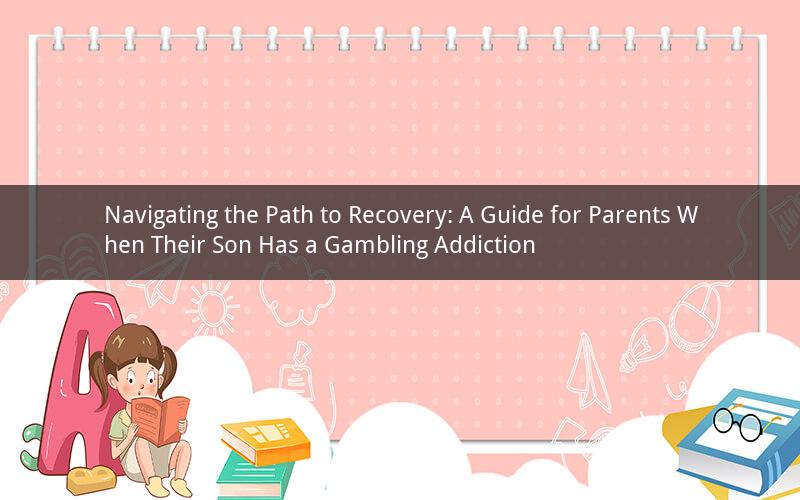
In the digital age, gambling has become more accessible than ever before. As a parent, discovering that your son has a gambling addiction can be overwhelming and daunting. However, with the right approach, you can help your son overcome this issue and lead a healthier, more fulfilling life. This article aims to provide guidance on what to do if your son has a gambling addiction, exploring various strategies and resources available.
Understanding the Problem
1. What is a gambling addiction?
A gambling addiction is a chronic, progressive condition characterized by an inability to control the urge to gamble, despite harmful consequences. It can affect anyone, regardless of age, gender, or background.
2. Signs of a gambling addiction in your son
Identifying the signs of a gambling addiction is crucial in helping your son. These may include secretive behavior, increased time spent on gambling activities, financial troubles, and emotional and psychological distress.
Seeking Professional Help
3. How to find a therapist for your son
It is essential to seek professional help for your son's gambling addiction. A therapist can provide personalized treatment and support tailored to his specific needs. To find a suitable therapist, ask for recommendations from friends, family, or your son's doctor, or search for therapists specializing in addiction treatment.
4. The importance of family therapy
Involving the family in the treatment process can be highly beneficial. Family therapy can help improve communication, rebuild trust, and develop coping strategies for dealing with the addiction.
Supporting Your Son
5. How to support your son during treatment
Supporting your son through his recovery journey is vital. Here are some ways to help him:
a. Be patient and understanding: Recovery is a long process, and setbacks are common. Offer your love and support without judgment or criticism.
b. Encourage healthy habits: Encourage your son to develop healthy habits, such as exercise, hobbies, and social activities, to replace his gambling behavior.
c. Monitor his financial situation: Keep an eye on his financial activities to prevent him from relapsing. Help him manage his finances and set realistic goals.
d. Attend support groups: Encourage your son to attend support groups, such as Gamblers Anonymous, where he can connect with others who share similar experiences.
6. Dealing with relapse
Relapse is a common challenge in addiction recovery. If your son relapses, it is important to remain calm and supportive. Encourage him to seek help from his therapist or support group, and remind him that relapse does not signify the end of his recovery journey.
Building a Support Network
7. The importance of a support network
A strong support network can make a significant difference in your son's recovery journey. This network may include family members, friends, therapists, and support groups.
8. Ways to build a support network
To build a support network for your son, consider the following:
a. Reach out to friends and family members who may be able to offer support.
b. Join a support group for parents of individuals with gambling addictions.
c. Attend workshops and seminars on addiction treatment and recovery.
Creating a Safe Environment
9. How to create a safe and supportive home environment
Creating a safe and supportive home environment can help your son stay on track with his recovery. Here are some tips:
a. Establish clear boundaries: Set rules regarding financial management, curfews, and other relevant issues.
b. Encourage open communication: Foster a safe space where your son can express his feelings and concerns without fear of judgment.
c. Provide resources: Ensure that your son has access to the necessary resources for his recovery, such as therapy sessions, support groups, and educational materials.
10. The role of education in preventing relapse
Educating yourself and your son about gambling addiction can help prevent relapse. Stay informed about the latest research, treatment methods, and coping strategies.
Conclusion
Helping your son overcome a gambling addiction is a challenging but rewarding journey. By seeking professional help, supporting your son, building a strong support network, and creating a safe environment, you can help him recover and lead a healthier life. Remember, patience, understanding, and love are key components in this process.
Questions and Answers:
1. Q: How can I tell if my son's gambling is a problem?
A: Look for signs such as secretive behavior, increased time spent on gambling, financial troubles, and emotional distress.
2. Q: Should I confront my son about his gambling addiction?
A: Yes, but approach the conversation with empathy and concern. Choose a calm, private setting and express your concerns without judgment.
3. Q: Can I force my son to seek treatment for his gambling addiction?
A: No, you cannot force your son to seek treatment. However, you can encourage and support him in this process.
4. Q: How long does it take for someone to recover from a gambling addiction?
A: Recovery can vary widely from person to person. Some may recover in a few months, while others may require ongoing treatment and support for years.
5. Q: Can a gambling addiction be cured?
A: While a gambling addiction cannot be completely cured, it can be effectively managed with proper treatment and support. With dedication and perseverance, individuals can lead a fulfilling life in recovery.